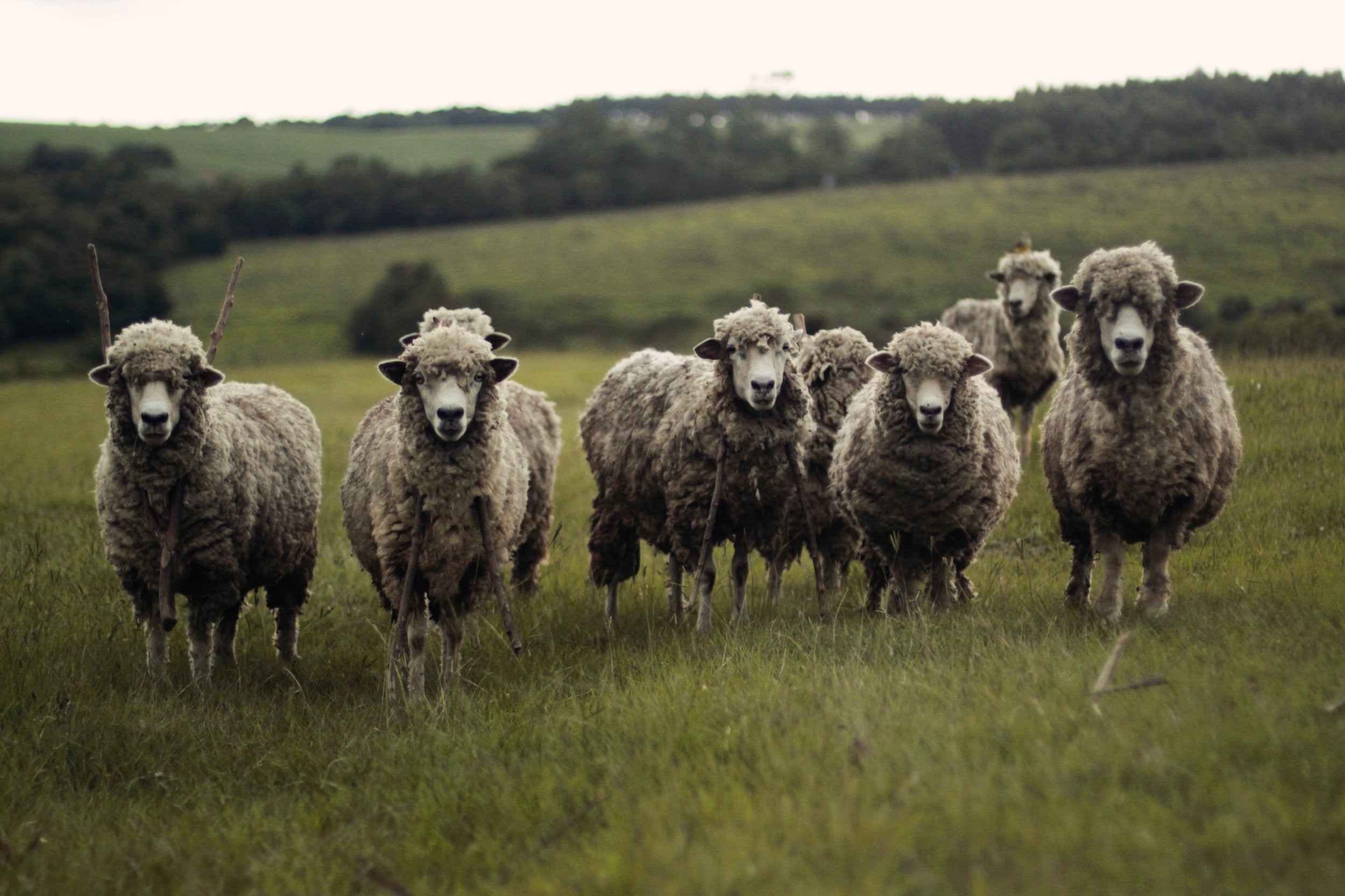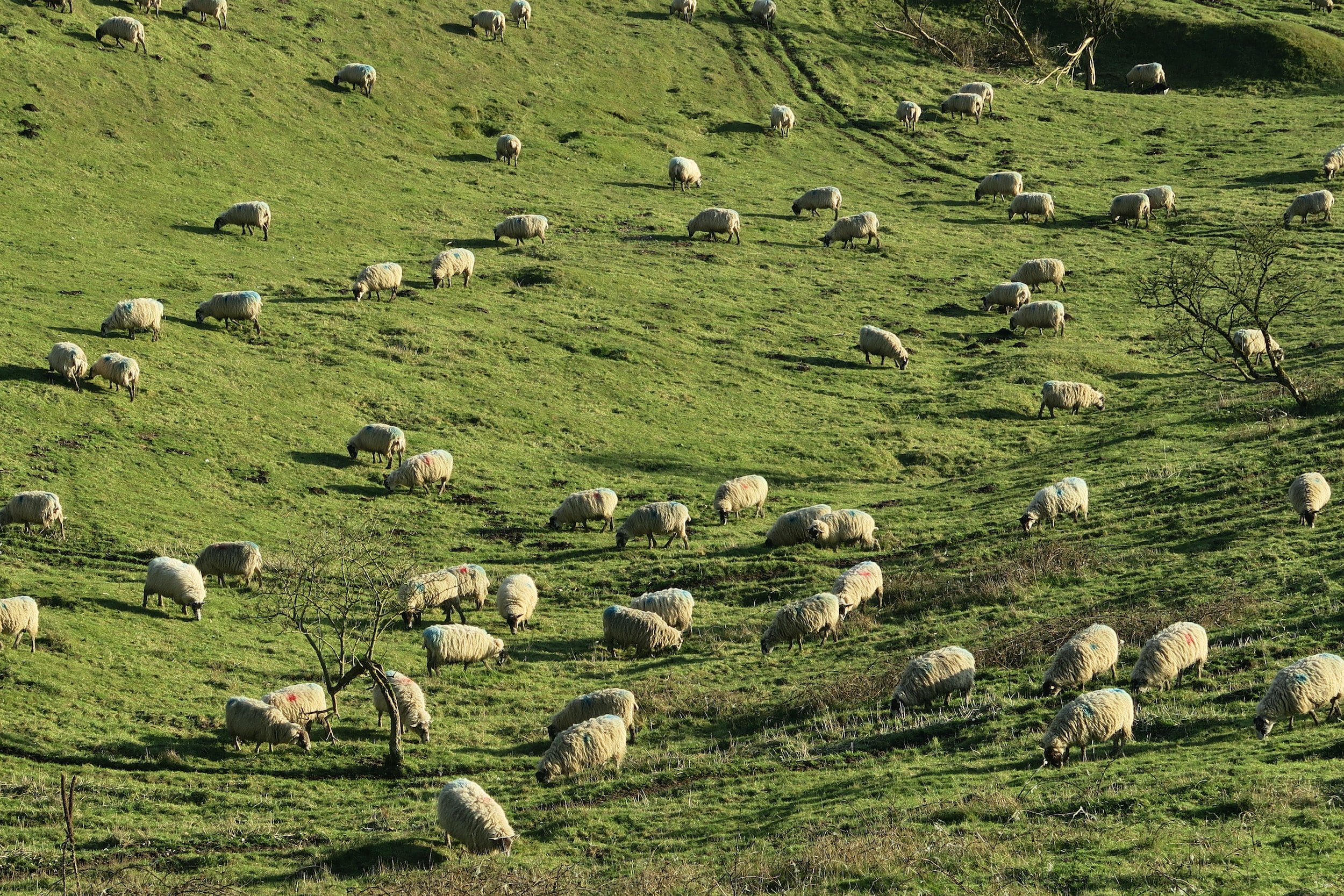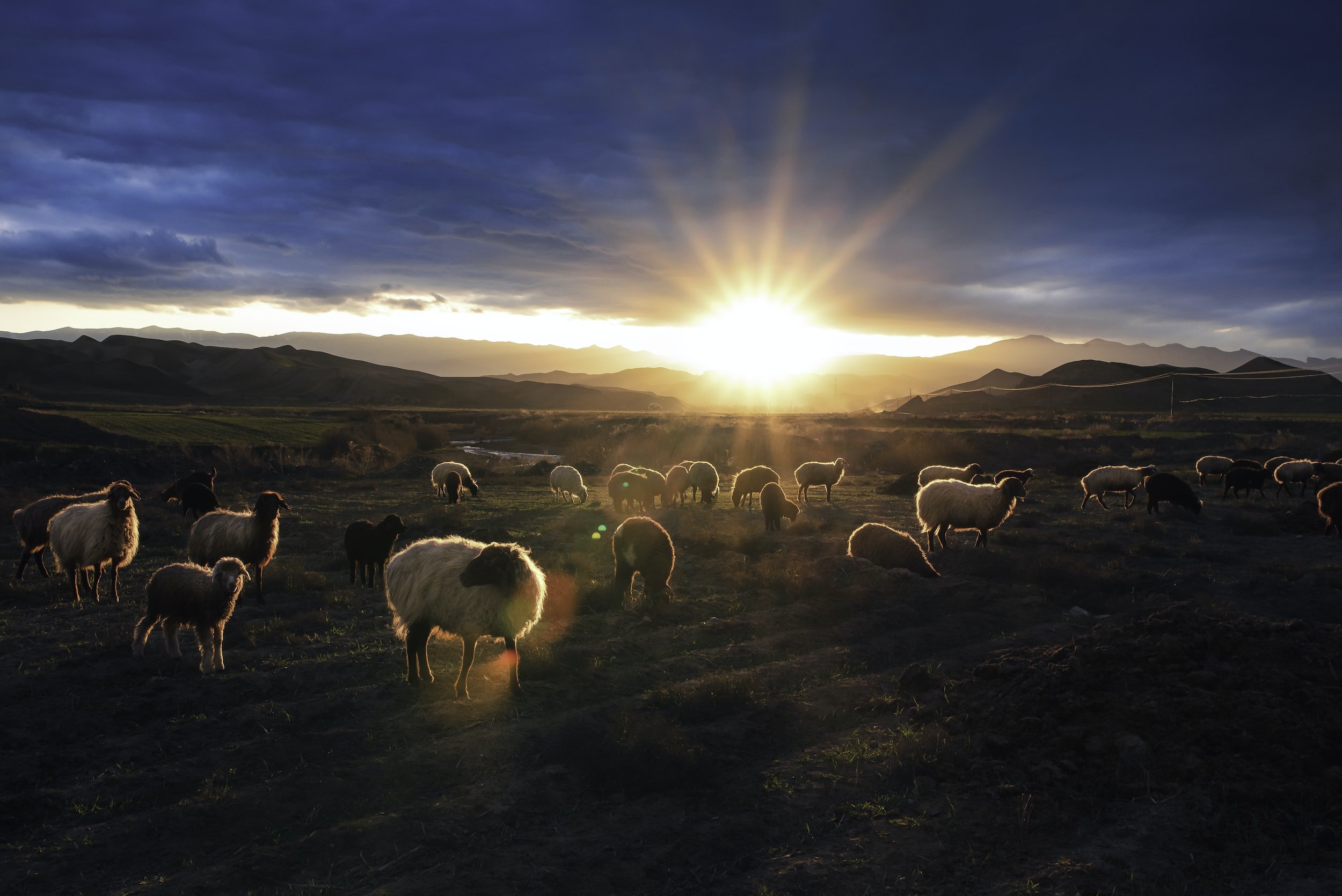Minerals for Sheep: Here’s What They Need
When you consider raising a flock of sheep, there’s more to it than just providing pasture to feed on and shelter for when the weather is bad. They are like humans in that they require the right balance of vitamins and minerals to remain healthy.
Sheep require various macro minerals and trace minerals in their diet to be at their peak health. When their forage does not provide these nutrients, you must include a well-balanced mineral to supplement their diets, providing what is lacking.
This article will explain what minerals should be given to sheep, how much they need, and what form you should provide minerals in. It will also cover signs of mineral deficiencies and where to buy minerals. Read on for everything you need to know about minerals for sheep.
**J&R Pierce Family Farm is a participant in the Amazon Services LLC Associates Program, an affiliate advertising program designed to allow sites to earn advertising fees by linking to products on Amazon. I often link to Amazon when recommending certain products, and if you choose to purchase, I may earn a small percentage of the sale. It costs you nothing extra, and all recommended products are ones that I personally vouch for. **
What Minerals Should I Give My Sheep?
To keep your sheep healthy, you should provide the following minerals:
Sodium
Calcium
Chlorine
Magnesium
Phosphorus
Potassium
Sulfur
Copper
Cobalt
Iodine
Manganese
Iron
Zinc
Selenium
Molybdenum
To learn more about providing free choice minerals for your sheep, you can watch this video:
What Vitamins and Minerals Do Sheep Need?
Sheep need a variety of vitamins and minerals to stay healthy. Depending on the circumstances, they may only get some of these nutrients from their daily diets and require supplements.
Vitamin E
Vitamin E is often required regularly for health needs, but forage generally meets sheep’s needs. However, the longer hay is stored, the quicker it loses vitamins, causing supplementation to be a necessity for periods of lengthy hay feeding.
Vitamin D
The skin naturally produces Vitamin D but requires proper amounts of sunlight to achieve adequate production. During the winter or long periods of remaining indoors, sheep need supplementation. Vitamin D is essential in using calcium, magnesium, and boron.
Vitamins C and B
With a properly functioning digestive system, a sheep will produce its own Vitamins B and C, meeting its nutritional needs. In the case of poor digestion, injections of these two vitamins will need to be given along with helping correct the animal’s digestive problems.
Copper
Copper is a requirement for the health of sheep; however, it is very easy to cross the delicate balance between safe levels and toxicity. You will need to fully evaluate your sheep before supplementing its copper. The best method is through a liver test to check levels.
Copper is required to properly use iron and the creation of hemoglobin, prevent sheep illnesses, bone growth, reproductive health, and wool production.
Cobalt
Despite being a trace mineral, cobalt is an essential requirement for the health of sheep. It’s used to produce Vitamin B12, necessary to rumen bacteria health, critical to folate health, and important in assimilating nutrients.
Selenium
Selenium is closely related to immune function and fertility, acting as an antioxidant. It is also used to build immunity to worms and in the recovery stages following a worm infestation. In combination with Vitamin E, it works to prevent and repair cell damage.
Zinc
Normal growth and reproductive development require regular zinc in the diet. It is also essential to disease-fighting ability and the immune response.
Calcium
Calcium is a macro mineral and is required in high amounts for the health of the sheep. It is critical to the health and life of the sheep and must remain in balance with the other macro minerals.
How Much Mineral Does a Sheep Need?
Salt (sodium and chlorine) is typically provided to ewes at 0.25 to 0.4 ounces per head per day. This will keep up their food and water consumption.
Calcium and phosphorus rations must be balanced before providing them to your sheep. A ratio of 5 or 6 to 1 of calcium to phosphorus tends to be satisfactory, but 2:1 is sufficient. In high rates of urinary calculi from high grain diets, reduce the ratio to 3 or 4 to 1.
Copper and selenium both walk a fine line between what’s beneficial and toxic. You need to know what level your sheep are at before you provide any supplements containing either of these minerals. While they are both required for healthy livestock, too much can kill them.
The amount needed of any mineral steadily increases with a lamb’s weight. It will have different nutritional requirements at various stages of its life, based on how much it weighs.
Should Sheep Have a Mineral Block?
Mineral blocks are not the ideal form of minerals to provide your sheep. First, they are hard enough to shed rainwater. This means that the sheep have a challenging time obtaining the nutrients they need from licking.
Second, the blocks are extremely hard, and sheep have been known to break their teeth on them. For these reasons, mineral blocks are not recommended for supplementing your sheep.
Other Ways to Feed Minerals to Sheep
Free-choice minerals are the primary way, other than a mineral block, to feed sheep minerals. This method allows the sheep to choose their minerals as needed, eating what they know is deficient. This takes the guesswork out for you, leaving it up to the sheep.
You should start by choosing the mineral supplement that best compliments the rations you are providing your sheep. For example, if the feed you supply is short on phosphorus, you will need a mineral low in salt but relatively high in phosphorus, at least 12%.
Trace mineralized salts offer copper, selenium, iodine, manganese, cobalt, and zinc, which many foods are deficient in. You must select one of these salts for sheep, not horses or cattle, as the copper content will be much too high for the larger animals.
Alternatively, you can buy a complete mineral, combining calcium, phosphorus, other major minerals, salt, and trace minerals. Understanding the right combination will also allow you to make your own homemade complete mineral.
There are limitations to the free choice system. For instance, if your water has high salt content, it may prevent your sheep from consuming minerals with a lot of salt.
Additionally, if your sheep have a trace mineral deficiency, you may need to make your own mineral mixture as the store-bought ones may not meet the requirements for your sheep.
Tips for Giving Minerals to Sheep
Here are a few tips for providing your sheep with the minerals they need.
Be Consistent
Consistency is one of the main things to consider when providing minerals for your sheep. Forage quality will change throughout the year, but the sheeps’ need for minerals will not go away. It may decrease but will remain a constant need.
Use Weatherized Mineral
Consider using a weatherized mineral. Due to their larger particle sizes, these minerals won’t clump when they get wet or blow away.
Get a Well-Balanced Formula
You must choose a well-balanced formula that is intended for sheep. Any other animal is not going to have a different balance of copper. It is a very fine line between what is safe and toxic.
Copper toxicity is often hard to identify until the sheep dies. However, some symptoms include depression, lack of appetite, red urine, and jaundice. A veterinarian will have to diagnose the condition and prescribe treatment.
Avoid Strictly Salt
You cannot simply offer salt and call it good. This will only provide some of the mineral support your flock needs. Too much salt can result in decreased appetite and reduced water consumption.
Salt should not be fed on its own but in combination with other minerals. A well-balanced mineral will prevent too much or too little salt from being consumed. While salt is essential, too much can be just as detrimental to your sheep’s health as too little.
Use a Portable Mineral Feeder
Choosing your mineral site is critical to success. You want to ensure that it is in a high-trafficked area where your sheep will notice it and make the most of its benefits. However, you can also use it to guide their grazing habits.
Moving the mineral around the pasture will help move the sheep to better forage. However, care has to be taken to not move the mineral too far from where the sheep want to be, including near their water source or shade.
If you’re looking for a mineral feeder that will make it easier for your sheep to access the nutrients they need, be sure to check out these plans to build a portable mineral box. It’s perfect for rotational grazing.
Signs of Mineral Deficiencies in Sheep
It is essential to identify vitamin and mineral deficiencies in sheep as soon as possible so that you can provide the appropriate corrective action with supplements. Not handling the situation quickly enough can result in the death of your sheep.
Vitamin E Deficiency
Vitamin E works with selenium to prevent and repair cell damage. It is essential in avoiding white muscle disease, reproduction, growth, and immune function.
Deficiencies of Vitamin E can include weaner ill thrift, reduced fertility, reduced immune response, and reduced wool production. It can also result in the appearance of white muscle disease. When the heart is affected, there can be sudden death.
You’ll notice poor growth, arched back, stiff gait, lameness, reluctance to move, and sudden deaths.
Copper Deficiency
The primary and most easily recognizable symptom of copper deficiency is swayback. This is a non-treatable condition in young lambs where progressive hind limb weakness leads to paralysis due to spinal cord damage during fetal development due to a copper-deficient ewe.
In older animals, the signs include reduced growth, susceptibility to bacterial infection, poor wool quality, and anemia.
Swayback cannot be evaluated while the animal is alive, with the exam needing to be conducted post-mortem on the spine. Liver tissue analysis for copper content is considered the most reliable standard for testing copper levels in an animal.
Biopsies can be taken while the animal is alive but are more commonly done during autopsy or at the slaughterhouse.
Any treatment with copper supplements should be done under the guidance of a veterinarian to prevent crossing the line in the other direction and making the animal copper toxic. Because the balance is so delicate, it can be challenging to find the correct dosage.
Cobalt Deficiency
Because cobalt is a major component of Vitamin B12, the symptoms associated with cobalt deficiency manifest as a result of missing the vitamin, not the mineral.
Signs of this deficiency include ill thrift, poor appetite, poor wool quality, watery discharge from the eyes, and lethargy. The affected lambs tend to have greater immune problems than other flock members.
The most affected lambs are those weaned in late summer and early fall.
Vitamin D Deficiency
A Vitamin D deficiency results in the sheep’s inability to properly use calcium. If the sheep is not getting enough sunlight, they will not produce enough Vitamin D to meet their nutritional needs. This type of deficiency is thought to be a cause of rickets.
Selenium Deficiency
Selenium deficiency is very closely related to Vitamin E deficiency. The symptoms are the same, including a reduction in wool production, female fertility, and immune response; weaner ill thrift; and the development of white muscle disease.
Your sheep will experience poor growth, arched back, stiff gait, lameness, reluctance to move, and sudden deaths.
Where to Buy Minerals for Sheep
Sheep minerals can be purchased in various locations, including the local feed store, some livestock veterinarians, and Amazon.
You can choose the products based on your needs and, for convenience, have them shipped directly to your home with Amazon. One example of these products is Purina Sheep Mineral, which offers salt, macro minerals, and trace minerals for a complete supplement.
We currently use a standard sheep mineral mixture from Nutrena combined with Redmond selenium 90 and diatomaceous earth to help with parasite prevention as well,
Final Thoughts
Supplementing your sheep’s diet is essential to ensure they are at peak health. While their needs for minerals will vary throughout the year, they will never completely stop. You must ensure they get a well-balanced mineral to meet their nutritional requirements.
Identifying deficiencies early on is key to trying to reverse them. While some cannot be treated, like swayback, others are easily remedied through correct supplementation. Seeking the advice of a veterinarian can be the best solution.
Buying sheep minerals has never been easier than it is today. You can go to your local feed store or order online, whichever is more convenient for you. Alternatively, you can make your own blend so that you know exactly what is going into it.
Want to learn more about farming? Be sure to check out these featured articles!
Subscribe to our email newsletter for regular tips and tricks on homesteading and farming – wherever you are. You can also follow us on Instagram (@jrpiercefamilyfarm) and Pinterest (J&R Pierce Family Farm) for frequent updates. Happy homesteading!









